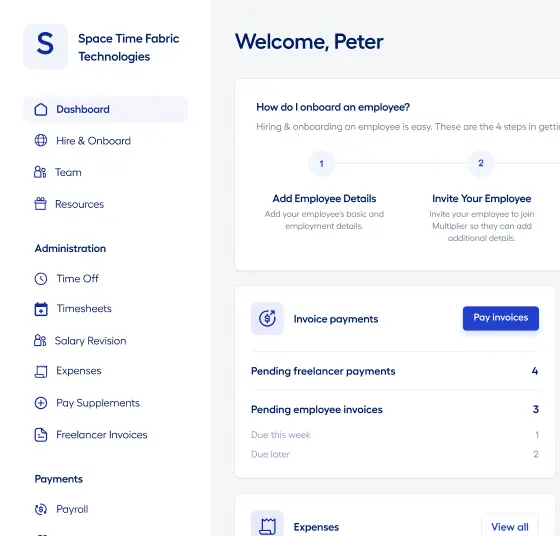Managing payroll is a fundamental aspect of any business, serving as both a vital function and a measure of efficiency. Payroll represents a significant investment and expense for companies, making it essential to execute it accurately to showcase effective processes and employee prioritization. Unfortunately, payroll errors are far too common in the UK, leading to unnecessary costs that could have been easily avoided.
Let’s explore five of the most frequent payroll mistakes and discover how companies can prevent them.
1. Delays in Payments to HMRC
Every profitable company in the UK is required to pay corporation tax. However, many businesses fail to settle their dues before the filing deadline, resulting in costly penalties. As tax filings have become more complex over the years, companies relying on manual payroll processes suffer the consequences.
To meet tax obligations, companies must fulfil various requirements each year, including:
- Submitting full payment and employer payment information
- Making PAYE payments
- Providing P60, P11, and P11(D) forms.
Additionally, they must stay updated on tax rates, thresholds, Director NI calculations, eligibility for employment allowance claims, and apprenticeship levy allowances. Handling these tasks manually demands a large and experienced workforce, resulting in significant payroll processing costs.
Alternatively, companies can adopt electronic platforms that automate these processes and establish approval workflows, enabling automated payments to HMRC and generating EPS reports. This automation eliminates costly penalties. Pento, renowned for its extensive integrations with HR data platforms and accounting tools, is considered a leading solution in this category.
2. Employee Misclassifications
HMRC takes misclassifications of employees very seriously, often imposing hefty fines without providing employers an easy way out. In the past, companies have been compelled to compensate misclassified workers for every year they were incorrectly categorized, with some instances lasting up to 14 years.
The UK’s worker categorization criteria contribute to these misclassifications. Unlike many other countries, the UK specifies three distinct categories: employees, contractors, and workers. To avoid such errors, HR onboarding flows should be tasked with accurately classifying workers from the start. However, employee statuses can change over time, leading to payroll complications. For example, an employee may request a flexible work arrangement, thereby potentially becoming a “worker” in HMRC’s eyes, protected by UK law.
Payroll departments must conduct validation checks before processing compensation and filing returns. This entails staying up to date with the government’s definitions for each category and ensuring that employment contracts use the appropriate language. Incorrectly labeling an employee as a “worker” in their employment contract could render the document invalid and result in penalties.
Collaboration between payroll departments and HR onboarding and offboarding teams is crucial to prevent such errors from occurring.
3. Incorrect Usage of Tax Codes
While worker categories can be complex for employers to navigate, tax codes present an even greater challenge. Unlike employee misclassifications, errors in tax codes directly affect employees, potentially damaging their morale and a company’s reputation in the job market. The government provides a list of tax codes and expects employers to assign the appropriate code to each employee. Using the wrong code can lead to over- or underpayment of taxes. In cases of underpayment, HMRC contacts the employee directly to demand additional payment.
Employees are unlikely to view their employers favorably in such situations. The introduction of the PAYE scheme has increased the frequency of these errors since employees no longer need to wait for the annual tax return filing date to settle claims but must address them monthly.
To prevent these issues and enhance employee retention, companies must promptly verify employee tax codes. TaxScouts offers a free tax code checker tool that reveals the PAYE implications for each code.
4. Pension Duty Errors
UK employers have a legal obligation to automatically enroll their employees in pension schemes. However, frequent changes in thresholds and regulations lead to frequent errors. For instance, the Department of Work and Pensions publishes earnings thresholds for automatic enrollment each year.
Using incorrect thresholds can result in employees missing out on pension contributions, which they are unlikely to appreciate. Other common errors include enrolling staff without notifying the relevant parties, which is a legal requirement, and neglecting maternity pay considerations when calculating contributions.
Payroll departments must regularly review publications from The Pensions Regulator to stay informed about changes and avoid mistakes that could jeopardize their companies.
5. Inaccurate Calculation of Employee Compensation
Mistakes in payroll calculations, such as incorrect deductions, failure to compensate for overtime, overlooking union contributions and pensions, and other common errors, can have a cascading effect, leading to further inaccuracies. Given the impact of salaries on employees’ lives, companies cannot afford to make mistakes in this area.
Although the government allows companies to amend their filings with additional FPS filings, the true damage lies in the perception of employee relationships. Poor record-keeping and inadequate data storage often contribute to these errors.
For example, an employee who has been incorrectly categorized as a contractor is not eligible for certain benefits. Companies that continue to provide these benefits inadvertently increase salary costs and put themselves at odds with HMRC.
Employers must assess the frequency of these errors and redesign their processes to minimize them. Utilizing an automated platform that synchronizes with the latest requirements and incorporates approval workflows is a wise approach.
Avoiding Payroll Errors is Imperative
Payroll errors are often avoidable, yet many companies continue to make elementary mistakes. Technological advancements have made it easier for companies to reduce these errors in payroll management. By implementing the right processes and supporting them with appropriate tools, companies can avoid fines and safeguard their employer brands from potential damage.
How Multiplier helps businesses ensure flawless payroll
Multiplier is a powerful platform that helps you manage payroll without hassle. It allows your organization to easily onboard, manage, and pay employees.
Multiplier makes it possible to automate payroll processing on a single platform. Let it be any location across the world, and we guarantee you 100% statutory compliance with tax and labor laws.
As Multiplier stands for end-to-end payroll automation, our platform comes in handy to prevent manual errors, achieve high precision, and gain complete control over your international employee payroll.
Keeping track of changes in tax-related laws of different countries is one of the major problems global payroll managers face. Multiplier can solve it just like that by having a constant eye for such legal concerns and maintaining updated tax tables to process global payroll efficiently.
Book a demo, and go global now!






